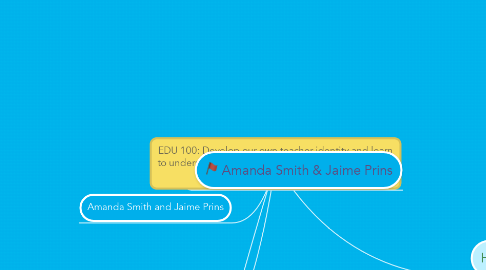
1. Sociological
1.1. Hidden curriculum
1.1.1. "The School as an informal system of socialization": article about things such as the 'hidden curriculum' and other techniques used by schools as an institution to 'properly' socialize students
1.2. Guest Speaker Melinda Mcnie
1.2.1. Issues of sexuality and how they are presented in the school system-how as educators can we reach out to every child and allow them to feel included: starts at a young age-discussing and creating tolerance/acceptance of all family types/sexual orientations
1.2.2. Watched a video of child who always thought of themselves as a boy but was born a girl. I was really moved by his story and the courage that he had to stand up to bullies and stay true to himself. His name is Wren Kauffman and is 11 - years old. He had to drop out of school when going through this process but was so resilient to what others had to say about him. I questioned how I as a teacher would show my acceptance and love to all students. It is so encouraging to watch videos like this to see that when a child is accepted for who they are they can have optimal learning and are truly happy.
1.3. Caution! Kids at Play
1.3.1. Typically children are involved with organized play and team/ group sport but we learned that free play is just as important to the holistic child and the child's development
1.3.2. Relating this to my life, I was given opportunities to play on cooperative and competitive team sports which has taught me many things about working with other people and having respect for all people.
2. Philosophical
2.1. Personal philosophy
2.1.1. Being able to find out which philosophy is right for your style of teaching and your goals in your classroom, (progressivism, social reform, etc.)
2.2. Greg Thomas
2.2.1. Know yourself and what you stand up for before entering a classroom: True to yourself
2.3. Mark Yurik
2.3.1. Professionalism: teacher is there for the students-their well-being and learning is in your hand
2.4. The Truth About Stories (Thomas King)
2.4.1. Understanding different philosohpies, being aware of other philosophies and how their identies have been shaped through this teaching
3. Amanda Smith & Jaime Prins
4. Amanda Smith and Jaime Prins
5. Historical
5.1. Changing role of teachers
5.1.1. Robinson (2010) video: Divergent thinking and modification/reform needed for the school system to better access students
5.1.2. 21 Things that will be obsolete*: as a teacher in the next few years adjustments must be made in order to keep up with the times as well as to prepare students for the world they will be living and working in
5.2. Frank Peters-organization of school system: how it's historically been set up
5.2.1. Education Framework: How it has evolved over the years. It changed throughout cities and provinces and throughout Canada due to new information
5.3. Past Mistakes
5.3.1. Surviving eugenics in the 21st Century: many mistakes have been made in the past, as an educator need to stay informed on these issues as well as protect our students and work towards further inclusion not exclusion
5.3.2. Residential Schools/Unjust treatment of Aboriginal Groups-another learning experience that demonstrates how detrimental discrimination has been in the past-by learning from this has the potential to prevent future discrimination and to improve Aboriginal school system-improve funding
5.4. The Truth About Stories
5.4.1. Aboriginal education has not been valued over the years and there is a constant negative connotation in regards to aboriginal education in Canada. It was nice to learn more about the Aboriginal perspective and how Canadian Education is dealing with providing equal amounts of opportunities for Aboriginal people.
5.4.1.1. Society believes that the majority of our tax money goes towards paying for Aboriginal peoples to have education but the reality of it is we need to actually listen to the people that have been affected instead of turning away from them and creating stereotypes.
5.5. A Day in a Life of an Elementary Teacher
5.5.1. Reading experienced teachers perspectives and hearing their advice they had for pre service teachers really helped me develop my teacher identity. Seeing how many hours they have to put in outside of school, shows the commitment it is but also it made me excited to work hard to be like those teachers in the stories
